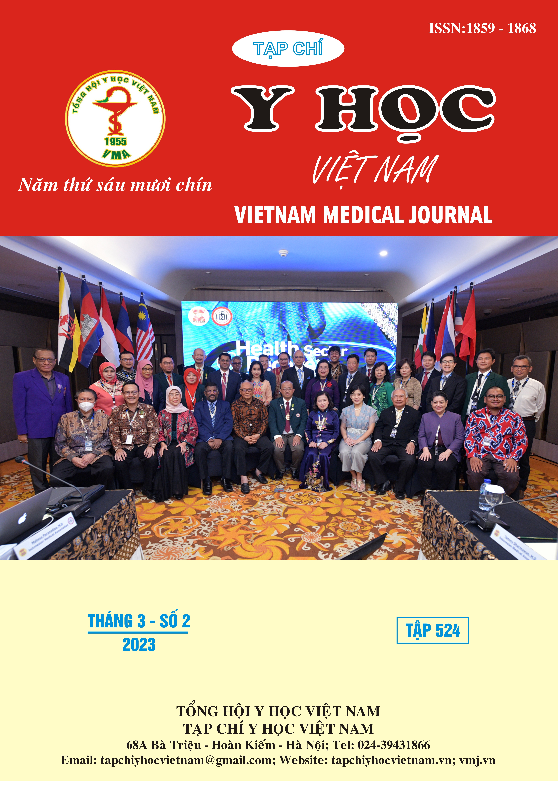PREDICTIVE VALUE OF CARDIOVASCULAR EVENTS BY ZWOLLE SCORE IN PATIENTS WITH ACUTE MYOCARDIAL INFRACTION AFTER PERCUTANEOUS CORONARY INTERVENTION
Main Article Content
Abstract
Objective: Predictive value of cardiovascular events of the Zwolle score in patients with acute myocardial infarction after percutaneous coronary intervention. Subjects and methods: A cross-sectional descriptive study on 100 patients with ST-segment elevation myocardial infarction after percutaneous coronary intervention at Can Tho Central General Hospital from 2020–2021. Results: The proportion of a low-risk group, according to Zwolle, accounted for 52%; the group with average risk was 48%; and the mean Zwolle score was 3.30 ± 1.49 points. Cardiovascular events occurred at a rate of 15% after 30 days of intervention, with mortality accounting for 2%, heart failure or angina pectoris accounting for 10%, recurrent MI accounting for 2%, and re-intervention or surgery accounting for 1%. There was a significant association between the Zwolle prognostic index subgroup and the main cardiovascular event 30 days after the intervention (p<0.001). The Zwolle cut-off point of 4.5 was the best cut-off for predicting the occurrence of major cardiovascular events with 100% sensitivity, 98.8% specificity, and an AUC of 0.996. Conclusion: The risk of cardiovascular events was higher when the score of Zwolle increased.
Article Details
Keywords
nhồi máu cơ tim cấp, ST chênh lên, điểm ZWOLLE
References
2. Ali Shah J., Ahmed Solangi B., Batra M. K. et al. (2021), "Zwolle Risk Score for Safety Assessment of Same-day Discharge after Primary Percutaneous Coronary Intervention", J Saudi Heart Assoc, 33 (4), pp. 332-338.
3. Caddell A., Belliveau D., Moeller A. et al. (2022), "Stable Patients With STEMI Rarely Require Intensive-Care-Level Therapy After Primary PCI", CJC Open, 4 (4), pp. 390-394.
4. De Luca G., Suryapranata H., van't Hof A. W. et al. (2004), "Prognostic assessment of patients with acute myocardial infarction treated with primary angioplasty: implications for early discharge", Circulation, 109 (22), pp. 2737-2743.
5. Güner Zeynep Esra, Altay Servet (2018), "Do We Hospitalize Patients with St-Segment Elevation Myocardial I˙nfarction Longer Redundantly: Assesment of Hospitalization According to Zwolle Risk Score", The American Journal of Cardiology, 5.
6. Kalkan Kamuran (2019), "Comparison of Zwolle, Cadillac and Syntax-2 risk scores in predicting contrast nephropathy development in patients with ST elevation ", Annals of Medical Research, 26 (7).
7. Parr C. J., Avery L., Hiebert B. et al. (2022), "Using the Zwolle Risk Score at Time of Coronary Angiography to Triage Patients With ST-Elevation Myocardial Infarction Following Primary Percutaneous Coronary Intervention or Thrombolysis", J Am Heart Assoc, 11 (4), pp. e024759.
8. Thygesen K., Alpert J. S., Jaffe A. S. et al. (2018), "Fourth Universal Definition of Myocardial Infarction (2018)", Circulation, 138 (20), pp. e618-e651.
9. Tralhao A., Ferreira A. M., Madeira S. et al. (2015), "Applicability of the Zwolle risk score for safe early discharge after primary percutaneous coronary intervention in ST-segment elevation myocardial infarction", Rev Port Cardiol, 34 (9), pp. 535-541.


